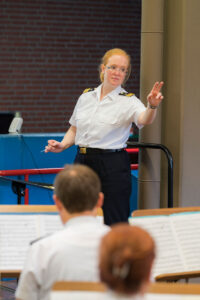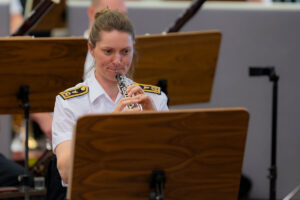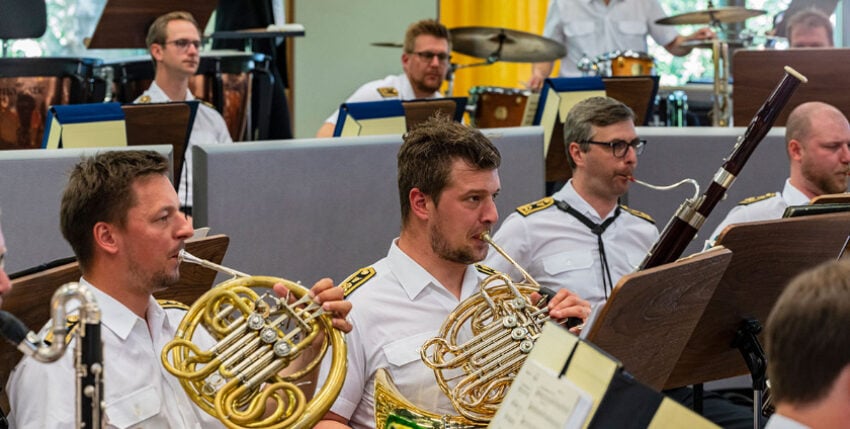Tattoo, ceremonial pledge, units leaving: Marching music is immediately associated with them. A look into the orchestra pit of the Kiel Naval Music Corps.
A sunny day in Kiel. The Gorch Fock sails in again. The music corps, led by Lieutenant Captain Inga Hilsberg, marches onto the Gorch Fock pier to the beat. Arriving at the berth, brief corrections are made, then familiar sounds are heard to welcome the ship. Change of scene. The former dining hall at the naval arsenal in Kiel serves as a rehearsal room. However, it is actually just a poor makeshift solution for the lack of space in the Wik. The Kiel version of a botched infrastructure measure. Cables, music bags, coffee cups and water bottles pile up on the floor of the room before the dress rehearsal. The musicians are waiting for the conductor, holding clarinets, saxophones and flutes ready for action. Finally, Lieutenant Captain Hilsberg takes her place on a podium, picks up the baton and conducts the first piece of music. There is a lot of joking during the short breaks and you can see the joy of the work in the smiling faces of the musicians.

Inga Hilsberg's small ensemble consists of 55 people. Each musician is also assigned to a quintet or quartet. Soloists are also available, for example a trumpeter for funeral services at the cemetery. Assignments are planned according to availability and the shortest route. All Bundeswehr orchestras are allocated by the Military Music Centre in Bonn. In a calendar year, the soldiers complete around 130 to 150 deployments, usually as a full orchestra, but sometimes only in small formations. In addition, there are assignments for charitable purposes and trips to the troops abroad.
Joining one of the Bundeswehr's music corps is just as demanding as the entrance tests for special operations units. The training programme for members of the military music service includes several years of study at the Robert Schumann University in Düsseldorf. Every permanent member of the Marine Music Corps has therefore completed a music degree.
More than just musicians
Rehearsals usually take place during the day, sometimes in a group, sometimes alone. Material maintenance and administration are also carried out. As the music corps is self-sufficient, the soldiers take care of all logistical and technical matters themselves, from printer paper to music supplies. Therefore, everyone in the troop has been assigned a secondary task. The company sergeant is not only a musician in the ensemble, but also has to deal with personnel processing after rehearsals. Of course, sport is also on the duty rota, as the musicians' performance must be encouraged and maintained. Holding a tuba for over an hour, marching in step with it, reading and playing music requires a good physical constitution. The troop is an example of diversity in the Bundeswehr, from 20-year-old volunteers to 60-year-old reservists.

Captain Lieutenant Inga Hilsberg is a lateral entrant. Her CV includes engagements ranging from musicals and theatre to well-known television productions. She has no regrets about joining the Naval Music Corps in Kiel. "We're part of the armed forces, so we're just a 'fake navy'," says the chief conductor with a wink through her glasses adorned with steering wheels. "But I serve in the most beautiful uniform and with enthusiastic musicians who come to work every day with a smile."
Daniel Angres










